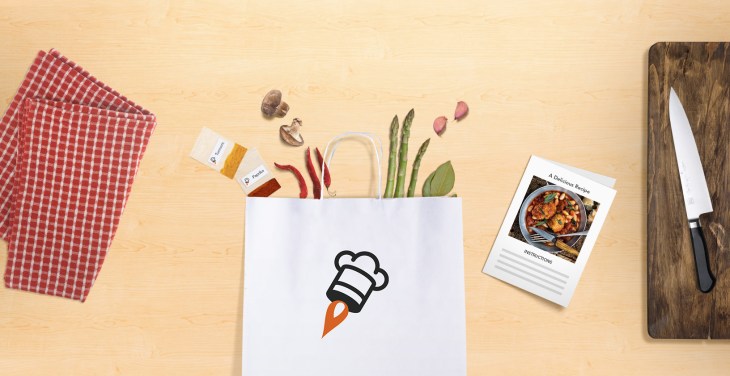In the last few years, a number of startups in the U.K. have tried the ‘recipe-kit’ model, offering a service that delivers fresh ingredients and the required instructions so that customers can get busy in the kitchen. However, some have fared better than others.
After courageously pivoting for a third time, Housebites shut down in February. And Dinnr, which attempted a similar model but with same-day delivery, also deadpooled at the beginning of the year. Meanwhile, still in business are Rocket Internet’s HelloFresh, which has raised over $60 million, undoubtedly giving it the longest runway, and U.K. competitor Gousto, which closed an $8.3 million Series A round in September. Now another U.K. startup is throwing its chef’s hat into the ring.
Shuttlecook, after graduating from accelerator Ignite100, is launching in London today with a more spontaneous version of the cook-at-home food delivery service, namely accepting orders as late as 3pm for same-evening cooking. And in doing so it believes it’s solved some of the problems inherent with the standard recipe-kit model, which, ultimately and ambitiously, tries to change people’s eating and cooking habits — something that is incredibly hard to do.
“We’re often compared to the likes of HelloFresh or Gousto,” says Shuttlecook co-founder Simon Edwards. “These services provide all the ingredients with recipe cards for multiple meals, which must be ordered several days in advance. They therefore require prior planning, otherwise the food will be wasted. With Shuttlecook, you can order up to 3pm on the day, for delivery that afternoon/evening before you leave work. You also make one-off orders – no subscription necessary.”
In other words, says Edwards, the startup’s real competitor are convenience stores that people pop into on their way home from work. “We fully answer the question ‘What’s for dinner tonight?’. Our meal kits are perfectly portioned out and quick to cook — under 30 minutes — a fast, easy solution that, crucially, allows home cooks to be spontaneous.”
Specifically, customers subscribe to a daily SMS text message linking to the day’s recipe. They can then order and pay in a few taps, and have all the ingredients delivered to their office by the end of the working day. That’s a radically different modus operandi than having to commit a few days in advance to what you want to eat, including having to cook that night.
However, the same-day twist on the recipe-kit model isn’t entirely new, especially for those following the UK startup scene closely. After calling it a day, Dinnr co-founder Michal Bohanes wrote a heartfelt postmortem, saying that the model was a “classic case of a solution looking for a problem”, and that — despite what they tell you during market research — getting people to cook more and eat healthier is a huge ask. The post went down well with VCs and the wider startup community alike, because it was hailed as a rare and honest story of failure. All of which makes Shuttlecook’s launch in London the more curious.
To that end, Ignite100’s Paul Smith thinks it’s all about execution, noting that Shuttlecook achieved higher sales during a 6 week trial in Newcastle than Dinnr did in London in 18 months. “The team spent a lot of time speaking to potential customers and validating assumptions before executing, and then measured every aspect of their trial and experimented daily to refine their service,” he says. “Ultimately, they’re addressing a genuine problem; it might not [be] the world-shattering sort that costs us sleep but it’s one we all have.”
“During Ignite we were encouraged to take a step back and look at the whole journey of deciding what to eat, purchasing and cooking,” adds Edwards. “We spent a few weeks considering the problem. We learnt a lot, perhaps most importantly that people will always be spontaneous (despite the urge to be more organised) and hence we had to address the problem while allowing and even encouraging this spontaneity. Shuttlecook was not born of a ‘eureka’ moment, rather it was a result of boiling the best solution we came up with down to the bare minimum — a true MVP.”
